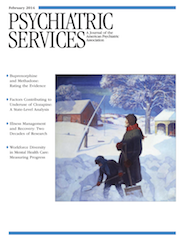Public Stigma and Self-Stigma: Differential Association With Attitudes Toward Formal and Informal Help Seeking
Abstract
Objective
Individuals in need of psychiatric treatment often avoid seeking help because of stigma. This study examined the impact of two stigma dimensions on help-seeking attitudes. Perceived public stigma refers to discrimination and devaluation by others, and anticipated self-stigma refers to internalization of negative stereotypes about people who seek help.
Methods
Data were from the 2009 Stigma in a Global Context–Belgian Mental Health Study, in which face-to-face interviews were conducted with a representative sample of the general Belgian population. The study reported here included 728 respondents who received a vignette depicting major depression or schizophrenia. Perceived public stigma and anticipated self-stigma were measured with validated instruments. Respondents’ attitudes toward help seeking were measured by the importance they assigned to care from formal and informal providers: general practitioners, psychiatrists, psychologists, family members, or friends. Multiple linear regression models were estimated.
Results
Respondents with higher levels of anticipated self-stigma attached less importance to care provided by general practitioners or psychiatrists, and those with higher levels of perceived public stigma rated informal help seeking as less important. The gender and the ethnicity of the person and respondents’ sociodemographic characteristics had relatively little effect on help-seeking attitudes.
Conclusions
Anticipated self-stigma and perceived public stigma appeared to have a differential impact on attitudes toward formal and informal help seeking. Internalization of negative stereotypes was negatively associated with the perceived importance of care from medical providers (general practitioners and psychiatrists). Awareness of stereotypes held by others deterred respondents from acknowledging the importance of informal care.



